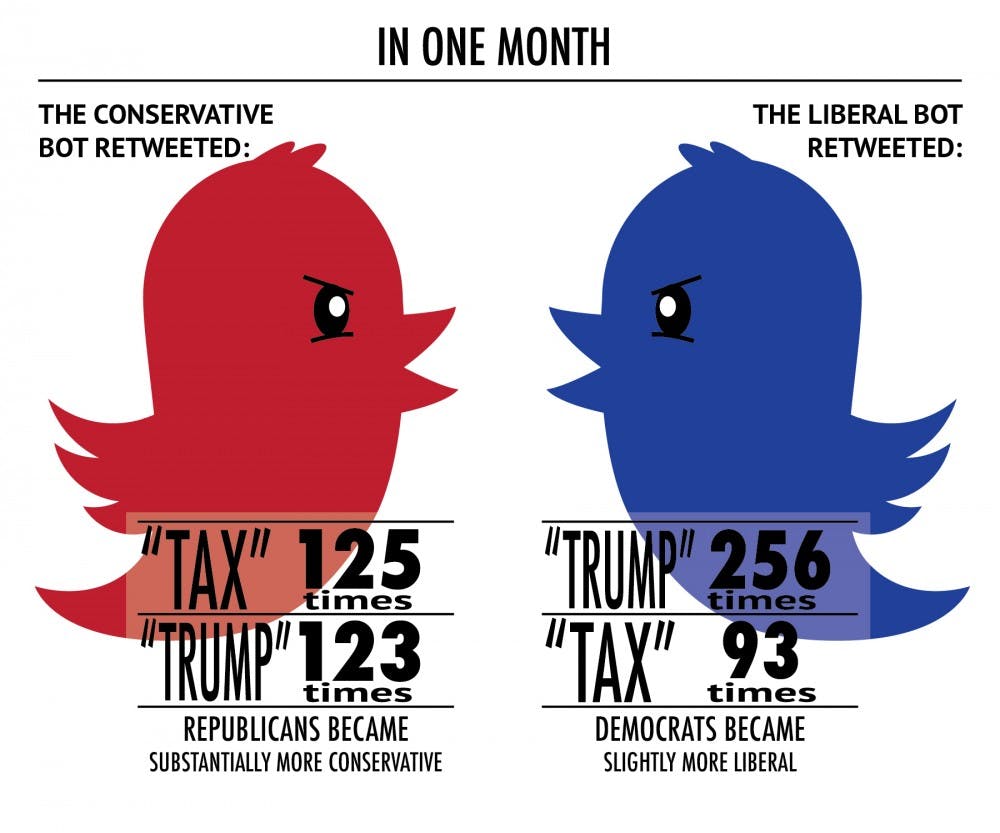Being exposed to diverse points of view would seem to broaden your perspective, right?
Not necessarily. A recent study published by a coalition of researchers from Duke, Brigham Young University and New York University found that being consistently exposed to tweets expressing the opposite political viewpoint to your own only entrenches your already-held beliefs.
One common critique of social media in a hyper-partisan era is that it creates "echo chambers"—users tend to predominantly follow those that share the same views that they do. In this vein, the study seems to show that in an "echo chamber" landscape, opposition only further cements people's beliefs—although the results were not statistically significant.
Twitter CEO Jack Dorsey said that he was experimenting with features to expose users to opposing viewpoints in order to reduce polarization—something this research indicates may be counterproductive, one researcher argued.
“We find that Republicans who followed a liberal Twitter bot became substantially more conservative posttreatment,” the researchers wrote in their abstract. “Democrats exhibited slight increases in liberal attitudes after following a conservative Twitter bot, although these effects are not statistically significant.”
The study involved groups of hundreds of self-reported Republicans and Democrats each taking a survey on their political views. After the survey, each party was split into two groups: one would follow a Twitter bot that retweeted with a bias toward the opposite of the subject’s party, while the other received no treatment.
The initial survey was conducted one week before a month-long bot treatment began, and the final survey was conducted a week after it ended. In order to ensure compliance, subjects were regularly quizzed on the content of the bot's tweets.
The study didn't just find that those who had followed the bot account had moved more toward their end of the political spectrum than their peers in the control group.
It also found that those who had performed better in the compliance quizzes tended to have grown more extreme than those who had not performed so well. This effect was not statistically significant for Democrats, but was "highly significant" for Republicans.
This trend indicates that those who had paid the most attention to the content of the tweets were the least likely to agree with it.
While this study only investigated frequent Twitter users, the researchers hope to expand the scope of their research. Christopher Bail, Douglas and Ellen Lowey associate professor of sociology and public policy and director of the Duke Polarization Lab, said the lab is conducting many new studies and trying to confirm that the study's findings apply to other platforms.
These findings would suggest that, at least in terms of social media exposure, the concept of an “echo chamber” does not fully explain why the political discourse seems to be so hostile.
Although this study was exclusively targeted at the effects of social media on individuals who already frequently use it, it is clear that there is a consistent bias against even entertaining an opposing viewpoint among a significant portion of the population.
Therefore, Bail argued in a New York Times op-ed that toying with echo chambers would not be enough to reduce partisanship.
"Some argue that social media sites will never provide the type of forum necessary to reduce political polarization and that we should focus on offline dialogue," Bail wrote. "Yet as social media continues to grow as a forum for political debate in our country, such solutions are not practical. We need to try something. But disrupting our Twitter echo chambers will most likely backfire."
Get The Chronicle straight to your inbox
Signup for our weekly newsletter. Cancel at any time.

